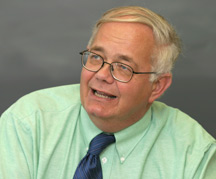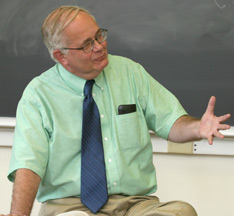 The Detroit Free Press has named Wabash Professor Bill Placher’s Callings: Twenty Centuries of Christian Wisdom on Vocation one of the Top Ten Books of 2005 on Spiritual Themes. An anthology of readings from Christian sources that was developed to help students think about their careers in terms of their faith or ethical commitments, Callings is one of ten books Free Press Religion Writer David Crum called "a sign of the vast breadth and growing sophistication of Americans' religious interests.
The Detroit Free Press has named Wabash Professor Bill Placher’s Callings: Twenty Centuries of Christian Wisdom on Vocation one of the Top Ten Books of 2005 on Spiritual Themes. An anthology of readings from Christian sources that was developed to help students think about their careers in terms of their faith or ethical commitments, Callings is one of ten books Free Press Religion Writer David Crum called "a sign of the vast breadth and growing sophistication of Americans' religious interests.
"This rich collection eloquently describes the call of God felt by dozens of men and women," Crum said of Callings, which was originally compiled and edited by Professor Placher as a text for professors teaching courses in the Programs for the Theological Exploration of Vocation (PTEV) projects funded by Lilly Endowment, Inc. at more than 80 colleges and universities across the United States.
With insights from 50 men and women on work and vocation, the book draws on writings from practically every historical period of the Church, including those of early Church fathers Ignatius of Antioch, Justin Martyr, Clement of Alexandria, and Augustine; reformers Martin Luther, John Calvin, and John Wesley; poet George Herbert and philosopher Soren Kierkegaard; and novelist Fyedor Doestoevsky, theologian Karl Barth, Trappist monk Thomas Merton, and Catholic Worker Movement founder Dorothy Day.
Placher cites writer Dorothy Sayers’ essay "Vocation in Work" as among those he found most moving as he edited the collection. Sayers writes about "how the artist might provide a model for how we all think about our vocation.
 "Her idea is that it doesn't make sense for an artist to join a union and get a 40-hour workweek, because what artists want is to free themselves up so they can do their work," Placher said in a recent interview published at PTEV’s website. "In some sense the dream would be that we could all live our lives that way. Then the central question becomes, ‘What if we could create a society where lots more people could feel that way about their work?’
"Her idea is that it doesn't make sense for an artist to join a union and get a 40-hour workweek, because what artists want is to free themselves up so they can do their work," Placher said in a recent interview published at PTEV’s website. "In some sense the dream would be that we could all live our lives that way. Then the central question becomes, ‘What if we could create a society where lots more people could feel that way about their work?’
"I think we’re not doing a very good job of that at the moment," Placher continued. "It’s not just people at the bottom of the economic scale having to work at fast food restaurants and whatever, but 70% of lawyers in this country say if they had a chance they’d do something else the next time around. Even the people who you would think are society’s success stories, who have the ability and the good luck and were able to choose whatever they wanted to do, don’t seem very happy, lots of them, about what they’re doing.
"I wish we could, as a society, find a better way to help people feel better about their careers and their lives."
Callings is the first of two books requested by PTEV for their programs. A companion volume, edited by Mark R. Schwehn and Dorothy C. Bass and featuring texts drawn mainly from fiction, memoir, poetry, and other forms of literature, is planned for 2006.